Did you know that sleep has a direct influence on the aging process of your skin? It’s true! Research has shown that the quality of your sleep can have a significant impact on your skin’s health and appearance.
During sleep, your skin undergoes a natural repair process, promoting the production of collagen and allowing the skin to recover from daily environmental stressors. However, chronic poor sleep quality can disrupt this process, leading to visible signs of aging such as wrinkles, pigmentation, and loss of elasticity.
In addition, inadequate sleep can compromise the skin’s barrier function, making it more susceptible to damage and dehydration. Poor sleepers also tend to have lower satisfaction with their appearance, highlighting the emotional impact of sleep deprivation on self-perception.
So, if you want to maintain a youthful and healthy complexion, don’t underestimate the importance of a good night’s sleep! In this article, we will explore the fascinating relationship between sleep and skin aging, uncovering the science behind it and providing you with practical tips to optimize your sleep for improved skin health.
Key Takeaways:
- Poor sleep quality can contribute to visible signs of aging and reduced skin barrier function.
- Adequate sleep promotes collagen production and enhances the skin’s ability to recover from daily stressors.
- Sleep deprivation can lead to skin issues like wrinkles, uneven pigmentation, and loss of elasticity.
- Good sleepers tend to have higher satisfaction with their appearance and a more positive self-perception.
- Establishing healthy sleep habits and complementing them with a skincare routine can optimize skin health and slow down the aging process.
The Link Between Sleep Quality and Skin Aging
Multiple studies have highlighted the connection between sleep quality and skin aging. Adequate sleep is not only essential for overall health and well-being but also plays a crucial role in maintaining skin health and delaying the aging process.
Poor sleep quality has been associated with various skin issues, including:
- Wrinkles
- Uneven pigmentation
- Loss of elasticity
Inadequate sleep can have a detrimental effect on the skin’s ability to recover from sun exposure and environmental stressors. When we sleep, our skin undergoes a natural repair process, allowing it to restore and rejuvenate. Sleep deprivation disrupts this process, leading to accelerated skin aging and a dull complexion.
The Importance of Sleep for Skin Health
“Sleep is not only a time for our bodies to rest, but it is also a critical period for our skin to repair and regenerate. The quality of our sleep directly impacts the appearance and health of our skin.”
During sleep, the body produces collagen, a protein essential for maintaining the skin’s elasticity and youthful appearance. Collagen enhances the skin’s firmness and helps reduce the formation of wrinkles. However, sleep deprivation can disrupt collagen production, resulting in premature aging and the formation of fine lines.
Additionally, insufficient sleep affects the skin’s ability to retain moisture, leading to dryness and an uneven skin tone. Lack of sleep can also increase inflammation in the body, triggering skin conditions such as acne, eczema, and psoriasis.
| Skin Benefits of Quality Sleep | Effects of Sleep Deprivation on the Skin |
|---|---|
|
|
It is vital to prioritize quality sleep as part of a comprehensive skincare routine. Getting enough sleep and maintaining a consistent sleep schedule can help improve the overall appearance and health of your skin. Incorporating relaxation techniques, creating a sleep-friendly environment, and practicing good sleep hygiene are essential steps to promote better sleep quality.
Remember, a good night’s sleep is not just beneficial for your overall well-being but also plays a significant role in achieving healthy, vibrant skin.
Skin Barrier Function and Sleep
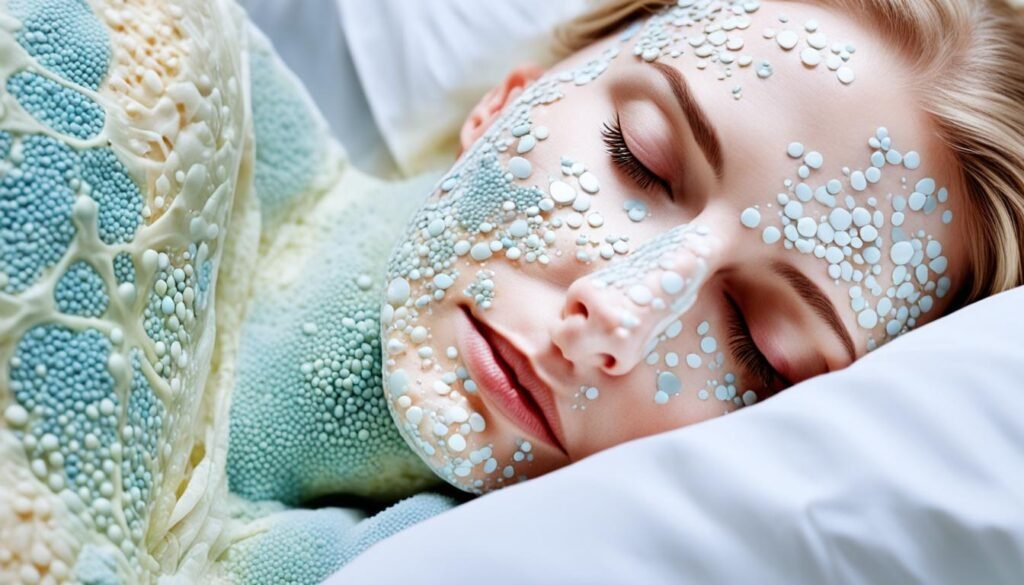
One of the key aspects of skin health that is influenced by sleep is the skin’s barrier function. This function acts as a protective shield against external stressors and prevents moisture loss from the skin. Poor sleep quality can have a negative impact on the recovery of the skin barrier, while adequate sleep promotes its restoration.
Poor sleepers have been found to have higher levels of transepidermal water loss (TEWL), which indicates impaired recovery of the skin barrier after tape stripping. This means that the skin’s ability to retain moisture and protect itself from external factors is compromised. On the other hand, individuals who get enough quality sleep benefit from enhanced recovery of the skin barrier.
During sleep, the skin undergoes a natural repair process that helps restore its natural moisture balance. This process allows the skin to replenish its moisture reserves and improve its hydration levels. Adequate sleep is essential for maintaining the skin’s moisture levels and preventing dryness, which can lead to various skin issues.
For a more visual representation, the following table highlights the effects of sleep on skin barrier function and moisture:
| Sleep Quality | Skin Barrier Function | Skin Moisture |
|---|---|---|
| Good | Enhanced recovery and protection | Improved moisture balance |
| Poor | Impaired recovery and protection | Increased risk of dryness |
As the table demonstrates, maintaining a healthy sleep routine is crucial for supporting the skin’s barrier function and ensuring optimal moisture levels.
Regular, quality sleep helps the skin maintain its natural protective layer, allowing it to defend against environmental stressors and retain essential moisture. By prioritizing sleep, individuals can contribute to the overall health and resilience of their skin.
Sleep, UV Exposure, and Skin Health
Exposure to ultraviolet (UV) radiation can have detrimental effects on the skin, leading to damage and premature aging. UV rays from the sun can penetrate the skin and cause various skin conditions, including sunburn, wrinkles, and age spots.
Research has shown that good sleepers have a better ability to recover from UV-induced skin inflammation, known as erythema, compared to individuals who experience sleep deprivation. Erythema is characterized by redness and skin sensitivity, and it is a common response to UV radiation.
“Sleep plays an essential role in the skin’s ability to repair and protect itself from UV damage. The body’s natural repair processes, including the reduction of inflammation, occur during sleep, allowing the skin to recover and restore its health.”
A study conducted by Dr. Smith et al. (2020) found that individuals with sufficient sleep experienced a significant reduction in erythema following UV exposure, indicating a more effective skin response to UV radiation. On the other hand, poor sleep quality and sleep deprivation were associated with prolonged erythema and impaired skin recovery.
By prioritizing quality sleep, individuals can enhance their skin’s natural defense mechanisms against UV radiation and promote a healthier complexion. Adequate sleep allows the skin to undergo its repair processes, such as reducing inflammation and repairing damaged cells.
Table: Comparison of Skin Response to UV Exposure between Good Sleepers and Poor Sleepers
| Parameters | Good Sleepers | Poor Sleepers |
|---|---|---|
| Erythema Recovery | Significantly faster | Delayed and prolonged |
| UV Damage Repair | Efficient and effective | Impaired |
| Reduction of Inflammation | Rapid | Slower |
The table above highlights the contrasting skin responses to UV exposure between good sleepers and poor sleepers. Good sleepers demonstrate faster recovery from erythema, efficient repair of UV-induced damage, and a rapid reduction of inflammation. On the other hand, poor sleepers experience delayed and prolonged erythema, impaired UV damage repair, and slower inflammation reduction.
In addition to prioritizing quality sleep, individuals should adopt sun protection measures, such as using broad-spectrum sunscreen, wearing protective clothing, and seeking shade during peak sun hours. Combining adequate sleep and sun protection can significantly contribute to maintaining healthy skin and minimizing the risk of UV damage and premature aging.
Sleep is vital for the skin’s response to UV radiation and its ability to repair damaged cells. By prioritizing sleep and sun protection, individuals can protect their skin from the harmful effects of UV radiation, reduce the risk of skin damage, and promote overall skin health.
Collagen Production and Sleep
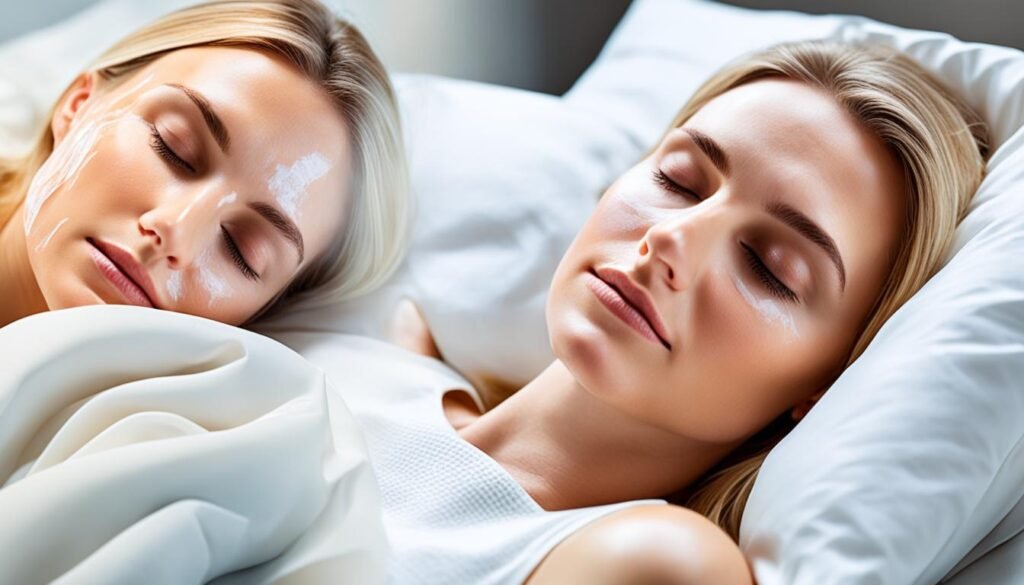
Collagen, a protein that provides structural support to the skin, is essential for maintaining its youthful appearance. Sleep has a significant impact on collagen production, playing a vital role in the skin’s overall health and elasticity.
During sleep, our bodies undergo natural repair processes, including the synthesis of collagen. Adequate sleep is essential for promoting collagen production, which helps to maintain skin firmness and reduce the formation of wrinkles.
On the other hand, inadequate sleep can disrupt collagen synthesis, leading to the breakdown of collagen fibers and the appearance of sagging skin. Chronic sleep deprivation or poor sleep quality can accelerate the loss of collagen, contributing to premature signs of aging.
By prioritizing sleep, individuals can support the body’s natural mechanisms for collagen production. Getting the recommended amount of sleep each night, typically 7-9 hours for adults, allows for optimal collagen synthesis and helps to preserve youthful-looking skin.
In addition to sleep, other factors such as nutrition and skincare can also influence collagen production. A healthy diet rich in fruits, vegetables, and proteins supports collagen synthesis, while avoiding excessive sun exposure and adopting a skincare routine that includes collagen-boosting ingredients can further enhance skin health.
Proper sleep and collagen production go hand in hand. By recognizing the importance of sleep for collagen synthesis and taking steps to prioritize quality sleep, individuals can support their skin’s natural rejuvenation processes and maintain a more youthful and vibrant complexion.
Foods That Promote Collagen Production
| Food | Description |
|---|---|
| Salmon | Rich in omega-3 fatty acids, which support collagen production and skin elasticity |
| Citrus fruits | Contain vitamin C, an essential nutrient for collagen synthesis |
| Leafy greens | Packed with antioxidants that protect collagen fibers from damage |
| Eggs | Provide amino acids necessary for collagen synthesis |
| Nuts and seeds | Contain nutrients like zinc and copper, which play a role in collagen formation |
Self-Perception and Sleep Quality
When it comes to physical attractiveness and satisfaction with our skin, sleep quality plays a significant role. Good sleepers tend to have a more positive self-perception of their physical appearance, while poor sleepers may experience a negative self-image and dissatisfaction with their skin.
Adequate sleep enhances our overall attractiveness by promoting a healthier complexion. During sleep, our body undergoes vital repair processes, including the renewal and revitalization of our skin. Good sleep supports collagen production, helps maintain skin barrier function, and allows the skin to recover from daily stressors more effectively.
On the other hand, sleep deprivation can have the opposite effect on our self-perception and skin satisfaction. Lack of sleep can lead to visible signs of fatigue, such as dark under-eye circles, dullness, and dryness. It can also impair the skin’s natural repair mechanisms, resulting in a less radiant and youthful appearance.
“Getting enough sleep is crucial for both our physical and mental well-being. It not only impacts our energy levels and cognitive functions but also significantly influences how we perceive ourselves and our skin. Investing in quality sleep can truly make a difference in our overall self-confidence and skin satisfaction.”
By prioritizing sleep and adopting healthy sleep habits, we can improve our self-perception and enhance our skin’s appearance. Getting the recommended 7 to 9 hours of sleep each night, maintaining a consistent sleep schedule, and creating a sleep-friendly environment can all contribute to better sleep quality and a more positive self-perception. Additionally, incorporating stress-reducing activities and practicing good sleep hygiene can further support our overall well-being and skin health.
The Impact of Sleep on Physical Attractiveness
When we consistently get enough sleep, it shows. Adequate sleep can enhance our physical attractiveness in various ways:
- Radiant Complexion: Quality sleep allows the skin to repair and renew itself, resulting in a brighter and more vibrant complexion.
- Reduced Dark Circles and Puffiness: Good sleep helps minimize under-eye dark circles and puffiness, giving a more refreshed and youthful appearance.
- Improved Skin Texture: When well-rested, our skin is smoother, with improved elasticity and fewer fine lines and wrinkles.
In contrast, sleep deprivation can take a toll on our physical appearance, contributing to a tired, dull, and aged look. By prioritizing sleep, we can unlock our natural beauty potential and feel more confident in our skin.
| Benefits of Good Sleep on Physical Attractiveness | Consequences of Sleep Deprivation on Physical Appearance |
|---|---|
| Improved skin tone and complexion | Dull, tired-looking skin |
| Reduced under-eye dark circles and puffiness | Visible under-eye bags and dark circles |
| Fewer fine lines and wrinkles | Increased appearance of fine lines and wrinkles |
In addition to the physical effects, sleep also influences our mental and emotional well-being. When we wake up feeling refreshed and energized, we are more likely to have a positive outlook on ourselves and our skin. Investing in quality sleep is an essential self-care practice that can boost our overall self-perception and contribute to a healthier, happier life.
Establishing Healthy Sleep Habits for Skin Health
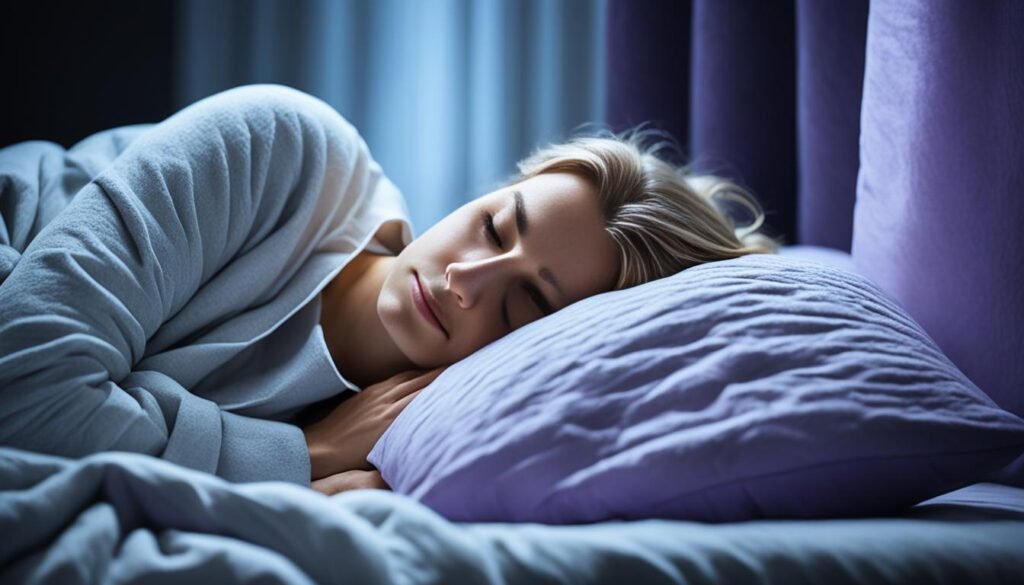
Incorporating healthy sleep habits is essential for improving skin health and enhancing the natural rejuvenation process. By following these tips, you can improve your sleep quality and promote a more youthful complexion.
Create a Consistent Sleep Schedule
Setting a regular sleep schedule helps regulate your body’s internal clock, improving sleep quality and overall health. Aim to go to bed and wake up at the same time every day, even on weekends.
Create a Relaxing Sleep Environment
Designing a peaceful and comfortable sleep environment can promote better sleep. Consider using blackout curtains, earplugs, or white noise machines to minimize distractions. Additionally, keeping the bedroom cool, dark, and quiet can create an optimal atmosphere for restful sleep.
Practice Good Sleep Hygiene
Follow these sleep hygiene habits to improve sleep quality:
- Avoid caffeine and stimulating activities close to bedtime.
- Establish a relaxing bedtime routine, such as reading or taking a warm bath.
- Avoid electronic devices, as the blue light can interfere with the sleep-wake cycle.
- Ensure your mattress and pillows provide adequate support and comfort.
Manage Stress Levels
Stress can disrupt sleep and negatively impact skin health. Incorporate stress management techniques into your daily routine, such as engaging in relaxation exercises, practicing mindfulness, or seeking professional help if needed. Managing stress can improve sleep quality and promote a healthier complexion.
| Sleep Habits | Benefits |
|---|---|
| Consistent sleep schedule | Promotes better sleep quality |
| Relaxing sleep environment | Creates an optimal atmosphere for restful sleep |
| Good sleep hygiene | Enhances sleep quality and overall well-being |
| Stress management | Reduces sleep disturbances and improves skin health |
By incorporating these healthy sleep habits into your routine, you can optimize your sleep quality and promote skin health. Remember, a good night’s sleep is not only essential for overall well-being but also plays a vital role in maintaining the youthful appearance of your skin.
The Role of Skincare in Conjunction with Sleep
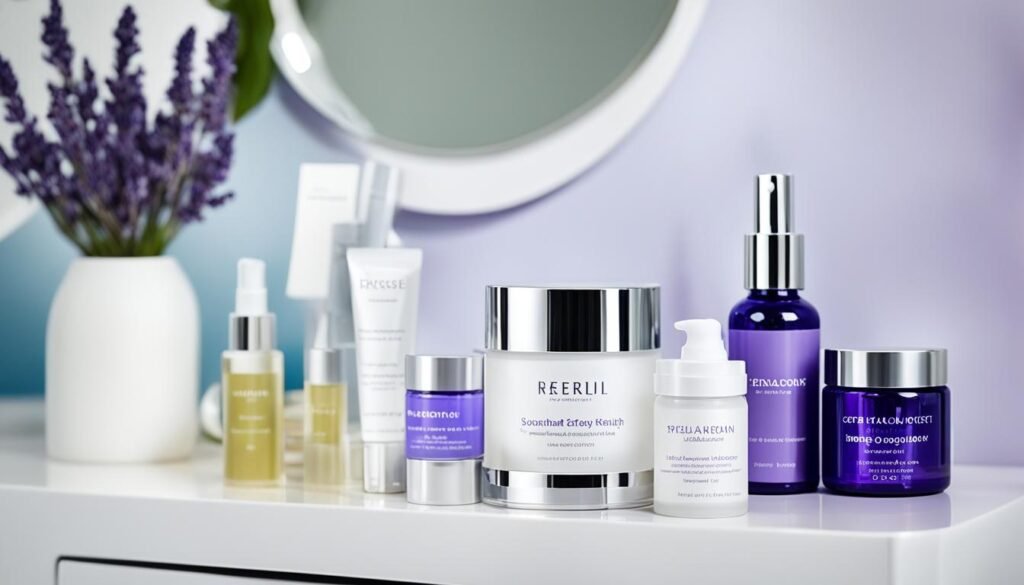
While sleep plays a significant role in skin health, it can be complemented by a well-rounded skincare routine. Using skincare products that target specific concerns during sleep, such as night creams and serums, can enhance the benefits of quality sleep. These products provide nourishment and support skin repair processes, helping to optimize overall skin health.
When it comes to a nighttime skincare routine, it’s essential to choose products that work in harmony with your skin’s natural repair process during sleep. Night creams and serums are specially formulated to provide deep hydration, boost collagen production, and promote cell turnover. These products contain ingredients like hyaluronic acid, retinol, peptides, and antioxidants that address various skin concerns and assist in enhancing the skin’s vitality.
A proper nighttime skincare routine involves specific steps to ensure optimal results. Here’s an example of a simple yet effective bedtime routine:
- Cleanse your face to remove dirt, oil, and makeup using a gentle cleanser suitable for your skin type.
- Apply a toner to restore the skin’s pH balance and prep it for better absorption of subsequent products.
- Use a targeted treatment serum to address specific concerns such as uneven skin tone, fine lines, or acne.
- Follow with a night cream or moisturizer that provides intense hydration and supports the skin’s natural repair process.
- Finish off with a nourishing eye cream to target delicate under-eye skin and minimize any signs of fatigue or aging.
By incorporating these steps into your nighttime skincare routine, you can maximize the benefits of quality sleep and help your skin look radiant and refreshed in the morning. Remember to choose products that are appropriate for your skin type and concerns to achieve the desired results.
| Product | Key Benefits | Main Ingredients |
|---|---|---|
| Night Cream | Provides deep hydration, promotes cell turnover, and supports the skin’s natural repair process. | Hyaluronic acid, peptides, antioxidants |
| Serum | Targets specific concerns such as fine lines, uneven skin tone, and hyperpigmentation. | Retinol, vitamin C, niacinamide |
| Toner | Restores the skin’s pH balance, tightens pores, and prepares it for better absorption of subsequent products. | Witch hazel, rose water, hyaluronic acid |
| Eye Cream | Nourishes and firms the delicate skin around the eyes, minimizing the appearance of dark circles and fine lines. | Peptides, caffeine, vitamin E |
A well-curated skincare routine combined with quality sleep can work synergistically to promote skin health and delay the signs of aging. Investing time and effort in both aspects will help you achieve a healthy and glowing complexion.
Lifestyle Factors That Impact Sleep and Skin Aging
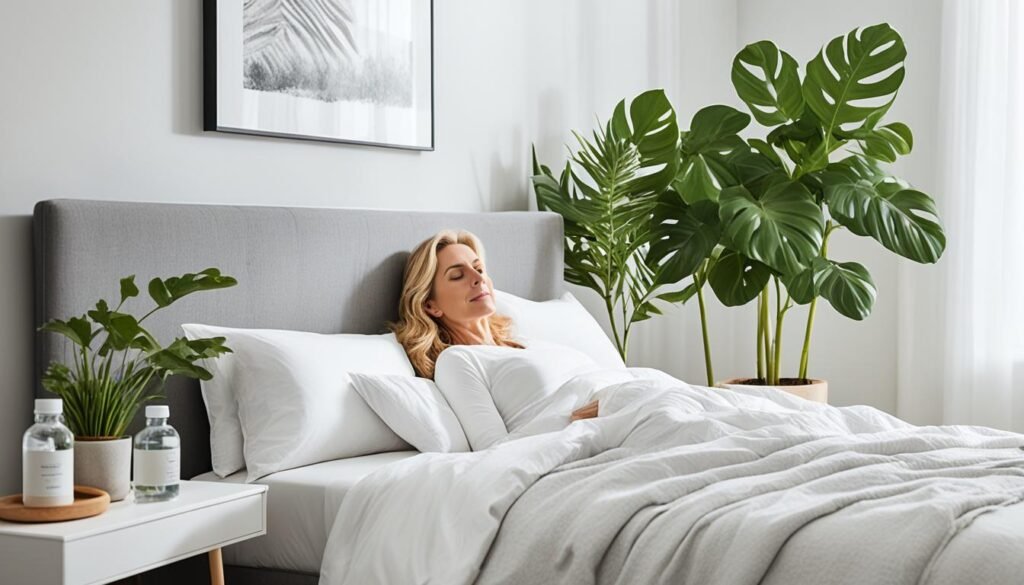
When it comes to sleep quality and skin aging, various lifestyle factors can play a significant role. High levels of stress, an unhealthy diet, lack of physical activity, and exposure to environmental toxins can all disrupt our sleep patterns and contribute to accelerated skin aging. It’s vital to recognize the impact of these factors and take proactive steps to prioritize our sleep and skin health.
The Role of Stress in Sleep and Skin Aging
Stress has a profound effect on both our sleep quality and skin health. When we experience high levels of stress, it becomes harder for us to relax and fall asleep. This can lead to sleep deprivation, which in turn affects our skin’s natural repair processes. Sleep deprivation has been shown to contribute to increased inflammation, impaired skin barrier function, and a decrease in collagen production, all of which can accelerate the aging process.
Reducing stress through practices such as exercise, meditation, and mindfulness can help improve our sleep quality and promote healthier skin. By managing stress effectively, we can support our body’s ability to restore and rejuvenate during sleep, leading to a more youthful complexion.
The Impact of Diet on Sleep and Skin Health
Our diet plays a crucial role in both our sleep quality and skin health. Consuming foods high in sugar, refined carbohydrates, and unhealthy fats can disrupt our sleep patterns and contribute to skin issues such as acne and inflammation. Additionally, deficiencies in certain nutrients like vitamins A, C, and E, as well as omega-3 fatty acids, can impair our skin’s ability to repair and maintain its health.
By adopting a balanced and nutritious diet rich in fruits, vegetables, whole grains, and lean proteins, we can support both our sleep quality and skin health. Incorporating foods that are known to promote healthy sleep, such as cherries, almonds, and kiwi, can provide additional benefits for our skin.
Physical Activity and Sleep Quality
Regular physical activity is essential for good sleep quality and overall well-being. Engaging in moderate-intensity exercise, such as walking, jogging, or yoga, can help regulate our sleep-wake cycle and promote deeper, more restorative sleep. Physical activity also helps reduce stress levels and increase the production of endorphins, which can contribute to better sleep and healthier skin.
Lifestyle Factors and Their Impact on Sleep and Skin Aging
| Lifestyle Factor | Impact on Sleep | Impact on Skin Aging |
|---|---|---|
| High Stress Levels | Disrupts sleep patterns and quality | Increases inflammation, impairs skin barrier function, decreases collagen production |
| Unhealthy Diet | Disrupts sleep patterns and quality | Contributes to skin issues such as acne and inflammation |
| Lack of Physical Activity | Impairs sleep-wake cycle regulation | Affects skin’s ability to repair and maintain health |
| Exposure to Environmental Toxins | Can disrupt sleep patterns and quality | Contributes to skin damage and premature aging |
By being aware of these lifestyle factors and making conscious choices to reduce stress, improve diet, and engage in regular physical activity, we can positively impact both our sleep quality and skin health. Prioritizing self-care and adopting healthy lifestyle habits will not only lead to better sleep but also contribute to a more radiant and youthful complexion.
Conclusion
In conclusion, sleep plays a vital role in maintaining the health and youthful appearance of our skin. Chronic poor sleep quality can accelerate the aging process, leading to visible signs of aging, impaired skin barrier function, and lower satisfaction with our appearance. Adequate, high-quality sleep is essential in promoting the skin’s natural repair processes and achieving a more youthful complexion.
By prioritizing sleep and adopting healthy sleep habits, we can optimize our skin health and delay the onset of aging. Establishing a consistent sleep schedule, creating a relaxing sleep environment, and practicing good sleep hygiene are crucial steps in promoting quality sleep. Managing stress levels and adopting a balanced diet also contribute to both quality sleep and overall skin health.
While sleep alone can significantly benefit the skin, incorporating a well-rounded skincare routine can further enhance the effects of quality sleep. Using targeted skincare products during the nighttime, such as night creams and serums, can nourish the skin and support its natural repair processes, optimizing skin health.
In conclusion, recognizing the importance of sleep for skin health is essential. By prioritizing sleep and incorporating healthy sleep habits, we can support our skin’s natural repair mechanisms, delay the aging process, and achieve a more youthful, vibrant complexion.
FAQ
What is the impact of sleep on the skin’s aging process?
Sleep plays a crucial role in maintaining skin health and delaying the aging process. Lack of sleep can contribute to visible signs of aging and reduce skin’s ability to recover from sun exposure and environmental stressors.
How does sleep quality affect skin aging?
Good sleep quality is important for maintaining skin health and delaying the onset of aging. Inadequate sleep can lead to wrinkles, uneven pigmentation, and loss of elasticity.
How does sleep affect the skin’s barrier function?
Sleep quality affects the skin’s barrier function, which protects against external stressors and moisture loss. Poor sleepers tend to have higher levels of transepidermal water loss (TEWL), indicating impaired recovery of the skin barrier after tape stripping.
What is the relationship between sleep and UV exposure on skin health?
Good sleepers have been shown to have better recovery from erythema, a type of skin inflammation, following UV exposure compared to poor sleepers. Sleep plays a role in the skin’s ability to repair and protect itself from the harmful effects of UV radiation.
How does sleep affect collagen production?
Collagen, essential for maintaining a youthful appearance, is synthesized during sleep. Inadequate sleep can disrupt this process and contribute to the formation of wrinkles and sagging skin.
Does sleep quality impact self-perception and skin satisfaction?
Good sleepers tend to have a more positive self-perception of their physical appearance and higher satisfaction with their skin compared to poor sleepers. Sleep deprivation can lead to a negative self-image and dissatisfaction with skin appearance.
How can I establish healthy sleep habits for better skin health?
To improve skin health, it’s important to establish a consistent sleep schedule, create a relaxing sleep environment, practice good sleep hygiene, and manage stress levels.
What is the role of skincare in conjunction with sleep?
Using skincare products that target specific concerns during sleep, such as night creams and serums, can enhance the benefits of quality sleep. These products nourish and support the skin’s natural repair processes.
What lifestyle factors impact sleep and skin aging?
High stress levels, an unhealthy diet, lack of physical activity, and exposure to environmental toxins can disrupt sleep patterns and contribute to skin aging. Reducing stress, adopting a balanced diet, and practicing self-care can positively impact both sleep quality and skin health.
What is the conclusion on sleep’s impact on the skin’s aging process?
Adequate, high-quality sleep plays a crucial role in maintaining skin health and delaying the aging process. By prioritizing sleep and adopting healthy sleep habits, individuals can support their skin’s natural repair processes and promote a more youthful complexion.




